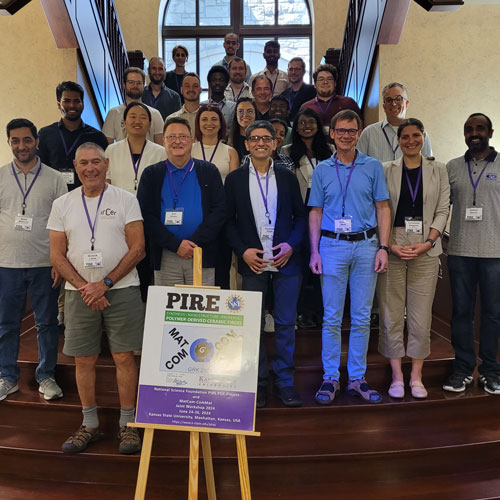July 12, 2024
Workshop on next-generation ceramics brings European students and professionals to K-State

Kansas State University hosted the seventh National Science Foundation sponsored Partnerships for International Research and Education, or PIRE project. This was third time that the meeting was held in conjunction with the German Research Foundation, known as DFG, funded research training group, or RTG. Previous two annual meetings were held in Kleinwalsertal, Austria.
The NSF-PIRE effort was led by Gurpreet Singh, Harold O. and Jane C. Massey Neff professor in the Alan Levin Department of Mechanical and Nuclear Engineering in the Carl R. Ice. College of Engineering. The contingents from Germany were led by Ralf Riedel, professor from Technische Universität Darmstadt, and Martin Heilmaier, professor at the Karlsruhe Institute of Technology. Students from three German institutions participated in the workshop: Technische Universität Darmstadt, Karlsruhe Institute of Technology, and DECHEMA Research Institute.
Singh was awarded the NSF PIRE grant in 2018 for his work on nanoscale precursors for silicon-based ceramics and concludes in September this year. The project aimed to establish research and education programs related to polymer precursor derived ceramic materials and composites in the U.S. academia. The project leverages unique expertise from leading universities in Germany, Italy, France and Japan who are renowned for advancements in processing of polymer precursors, fibers and related systems.
"The RTG on Materials Compounds from Composite Materials is focused on investigating new types of composite materials and coatings for refractory metal alloys that allow the temperatures of combustion engines and processes to rise sharply under extreme environmental conditions. There is good synergy between the U.S. PIRE and German RTG projects," Riedel said.
The research training group is a joint project of the Karlsruhe Institute of Technology, led by Professor Martin Heilmaier and Technische Universität Darmstadt, led by Riedel. DECHEMA Research Institute, led by Mathias Galetz, is also involved in the project.
"This was the final annual meeting of the PIRE project and we wanted to have strong focus on student learning, overall research accomplishments, and the path forward," Singh said. "This year we had invited guest speakers from University of Michigan, University of Bayreuth and the University of Montpellier. The workshop provided incredible learning opportunity to K-State students and those from PIRE partner institutions."
The workshop covered topics in the field of protective coatings for metal alloys, innovative materials science via machine learning, additive manufacturing of ceramics, and other advanced materials for aerospace applications. Industry participation was represented by attendees from Spirit Aerosystems and the Starfire Systems company.
"We feel excited about the future of the PDC materials and collaborations that are promoted through organization of joint meetings," Singh said.
The U.S. team will continue to seek collaborative funding opportunities with industry that involve U.S. work force development on advanced manufacturing, and the NSF/DFG that call for exchange of student researchers between the two countries. For more information about PIRE and related innovations visit k-state.edu/pire/ or call 785-532-7085.
